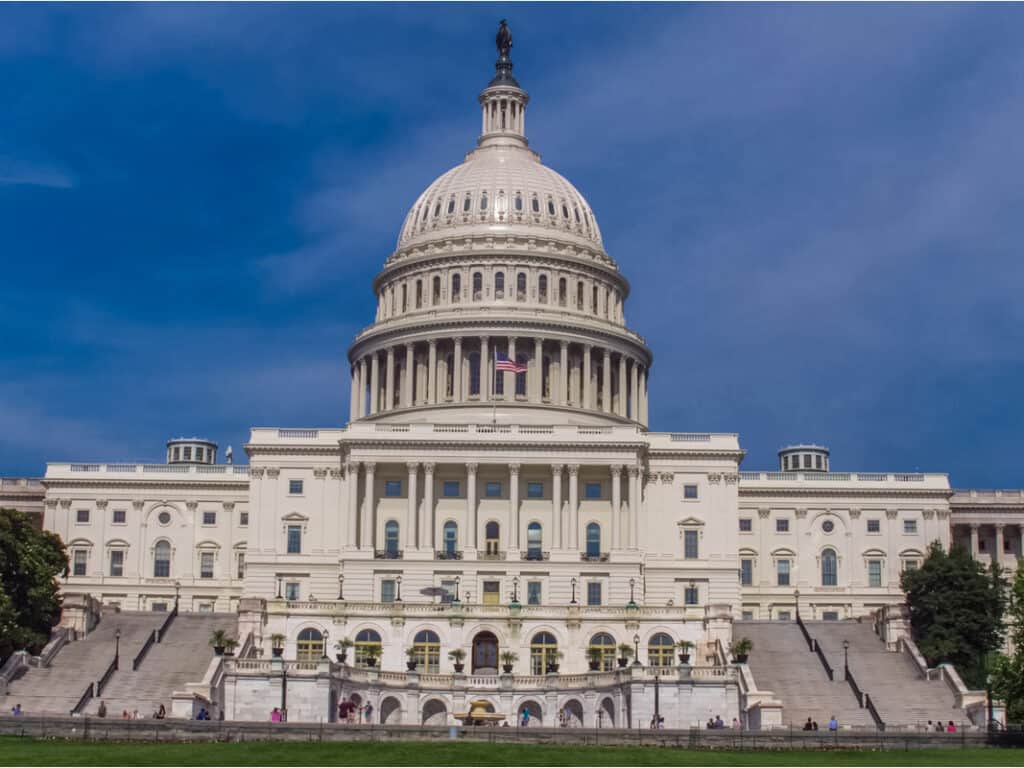Fashion sustainability laws in the US: here's what you need to know
4-8% of the world’s global greenhouse gas footprint comes from the apparel and footwear industry, making it one of the top contributors to the climate crisis.
Greenhouse gas emissions and many other environmental issues in the fashion industry have gained more attention in recent years. There is also widespread scrutiny of social and human rights issues within the fashion industry, including fair wages and wage theft.
The increased attention has resulted in several proposed laws to address social and environmental issues in fashion. In this article, we will detail the three fashion sustainability laws that we think are the most important to be aware of for apparel businesses located in or selling within the US:
1. Garment Worker Protection Act
2. Fashioning Accountability and Building Real Institutional Change Act (FABRIC Act)
3. Fashion Sustainability and Social Accountability Act
California’s Garment Worker Protection Act
Status: Live and adopted
Government: State of California
The Garment Worker Protection Act aims to ensure that workers in California’s garment industry are paid fairly. The Fair Labor Standards Act of 1938 (FLSA) already prohibited garment manufacturers in the US from paying workers by piece rate. However, this bill expands protections afforded to garment workers and the definition of garment manufacturing, resulting in the protection of more workers.
What is it?
The Garment Worker Protection Act makes California the first state to adopt legislation requiring hourly wages for garment workers, prohibiting any garment manufacturer or contractor from paying garment workers by piece or unit. This change protects workers because the time it takes to create a garment piece often results in hourly pay below California’s minimum wage.
The Act also allows workers to seek compensatory damages against a manufacturer, helping workers ensure they are paid for work they have already completed. Manufacturers must keep worker and pay records for three years, creating a mechanism for individuals to file claims to get their unpaid wages.
Expanded definition
The bill expands the definition of garment manufacturing from the FLSA’s to include the dying, the changing of garment design, and the process of adding a label to the design. This is because while a lot of garment manufacturing is outsourced to other countries, many of the final alterations are completed in California. Therefore, more workers are protected under the expanded definition.
Penalties
Employers that pay by piece rate and manufacturers that contract with them will be liable for compensatory damages of $200 per employee per pay period.
Fashioning Accountability and Building Real Institutional Change Act (FABRIC Act)
Status: Proposed bill, in committee discussion
Government: United States
The FABRIC Act is a proposed federal bill that aims to protect American garment workers and revitalize the domestic garment industry by improving working conditions, reforming the piece rate pay scale, and investing in domestic apparel production. The Act also seeks to offshore garment manufacturing to countries that lack adequate working conditions in favor of domestic manufacturers.
What is it?
The Act requires all garment manufacturers to register with the department of labor, creating greater transparency and holding bad actors accountable. It also requires fashion brands and retailers to be jointly responsible for wage violations alongside their manufacturing partners and contractors.
Lastly, the FABRIC Act is very similar to the California Garment Worker Protection Act in that it requires garment workers to be paid hourly instead of by piece rate. It also ensures that workers get paid for the work they have already performed, addressing the issue of wage theft across the US.
Domestic manufacturing incentives
The FABRIC Act includes a grant program to help address the goal of offshoring garment manufacturing and to create less dependency on overseas suppliers. The Domestic Garment Manufacturing Support Program will be a 40-million-dollar program that supplies grants to US manufacturers for equipment costs, safety improvements, and training and workforce development. A 30% tax credit will also be issued to garment manufacturers who move their operations to the US.
New York Fashion Sustainability and Social Accountability Act
Status: Proposed bill, in committee discussion
Government: State of New York
The NY Fashion Sustainability and Accountability Act requires fashion companies to map their supply chains and address the human rights and environmental impacts of their operations and supply chain. The Act will be the first US law with sustainability requirements aimed toward large fashion companies.
Scope
All fashion manufacturers or retailers with annual worldwide gross receipts exceeding 100 million US dollars that do business within the state of New York are covered within this Act. This includes companies headquartered and operated outside of New York and the US if they sell their products in New York.
What is it?
The Act requires fashion retailers or manufacturers to disclose sustainability and due diligence activities. Companies subject to the Act must map their supply chain and perform and disclose environmental and social due diligence. Some of the required due diligence indicators include:
- Carbon emissions
- Water footprint
- Chemical use
- Worker wages
- Collective bargaining
- And many more
Click here for a complete list of due diligence requirements.
Covered companies must take a risk-based approach and implement good faith efforts to map their suppliers from Tier One through Tier Four. They will then need to assess their environmental and social impacts and put policies and processes in place to decrease the negative effects of their supply chain.
Reports of supply chain due diligence activities and performance must be made available on the company’s website in a way that is readily available and free to access.
Enforcement and community fund
There are significant penalties for companies that do not comply with the proposed Act. Companies found to be out of compliance by the New York Attorney General will have three months to remediate their noncompliance. If they are out of compliance after three months, they may receive a fine of up to 2% of their annual revenue.
All fines from the Act will finance the newly established Fashion Remediation Fund, which will distribute funds to environmental and labor remediation projects in New York.
How Sedex can help
Sedex can help your business address existing fashion sustainability laws, like California’s Garment Worker Protection Act, and prepare you for future regulations, like the FABRIC Act and New York’s Fashion Sustainability and Social Accountability Act.
With Sedex’s Consulting services, we can guide you through the legislative requirements for your business and design custom solutions that keep you in compliance with fashion sustainability laws.
The Sedex platform can help your business meet requirements for fashion sustainability legislation by:
- Mapping your supply chain from Tier One to Tier Four suppliers
- Taking a risk-based approach to assessing your suppliers by using our risk assessment tool
- Addressing the negative social and environmental impacts of your supply chain
- Reporting on supply chain sustainability activities and performance
Interested in learning more about how we can help you comply with fashion sustainability legislation?
Sources:
1. NY Fashion and Sustainability Act: https://www.nysenate.gov/legislation/bills/2021/S7428
2. Garment Worker Protection Act: https://www.dir.ca.gov/DLSE/GarmentFAQs/
3. FABRIC Act: https://thefabricact.org/



